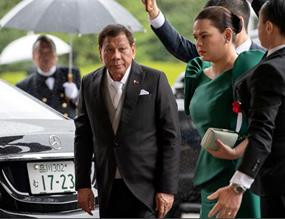Former Philippine President Rodrigo Duterte was taken into custody by the International Criminal Court (ICC) on Wednesday after his arrest in Manila on charges of crimes against humanity. The 79-year-old former leader faces accusations related to thousands of extrajudicial killings carried out under his controversial war on drugs policy. Duterte was flown to The Hague, Netherlands, where he will stand trial before the ICC.
The arrest was announced late Tuesday by Philippine President Ferdinand Marcos Jr., who confirmed that his government acted in accordance with an ICC arrest warrant and an Interpol red notice. "We followed the legal procedure that is necessary," Marcos said at a press conference. The warrant, issued as part of the ICC's 2021 investigation, alleges that Duterte oversaw a violent crackdown that resulted in the deaths of thousands, with some estimates reaching up to 30,000.
Duterte's daughter, Vice President Sara Duterte, condemned the arrest and extradition, calling it "state kidnapping" and accusing the Marcos administration of betraying national sovereignty. She left the Philippines on Wednesday to meet her father in The Hague and consult with his legal team.
Upon arrival at Rotterdam The Hague Airport, Duterte was placed in ICC custody. The court confirmed in a statement that medical personnel were on hand "as a precautionary measure," though it did not disclose details about his health. Reports from the scene described an ambulance and a police helicopter at the airport, while a convoy of vehicles transported Duterte to a detention center.
Human rights groups and victims' families welcomed the arrest as a long-awaited step toward accountability. The National Union of Peoples' Lawyers, which represents families of drug war victims, issued a statement celebrating the move: "We relish the victory of his arrest today. It shows how international law can be used to hold state officials accountable."
Amnesty International's Jerrie Abella called Duterte's detention a "monumental and long-overdue step for justice," adding that the case demonstrates that "suspected perpetrators of the worst crimes, including government leaders, will face justice wherever they are in the world."
Duterte's supporters, however, have fiercely opposed the arrest. His legal team has filed multiple petitions with the Philippine Supreme Court, arguing that the ICC lacks jurisdiction since the Philippines withdrew from the court in 2019. His son, Davao City Mayor Baste Duterte, and his youngest daughter, Veronica Duterte, are leading efforts to have him returned to Manila.
The ICC maintains jurisdiction over alleged crimes committed before the Philippines' withdrawal. The prosecution, led by ICC chief prosecutor Karim Khan, has presented evidence that Duterte directly oversaw state security forces responsible for mass killings between 2011 and 2019. "There are reasonable grounds to believe that security forces under Duterte's control killed thousands of people labeled as criminals or drug dealers," the prosecution stated.
Duterte's first court appearance will be scheduled in the coming days, during which judges will confirm his identity, inform him of the charges, and set a hearing date to determine whether there is sufficient evidence to proceed to trial. If convicted, Duterte faces a maximum sentence of life imprisonment.
Marcos defended the decision to enforce the ICC warrant, stating that failure to do so could jeopardize the Philippines' cooperation with international law enforcement agencies. He rejected claims that Duterte's arrest was politically motivated, calling it "proper and correct."
Meanwhile, grieving families of Duterte's alleged victims held demonstrations in the Philippines as his plane departed for The Hague. Some carried urns containing the ashes of loved ones who were killed in the drug war. "Duterte is lucky he has due process," said Emily Soriano, whose son was killed in 2016. "But our children who were killed did not have due process."






